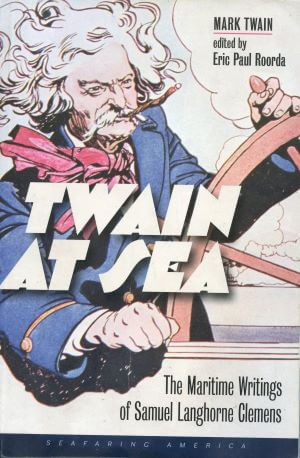The name “Mark Twain” probably brings to mind stories of rivers and riverboats. But in addition to making 120 trips on the Mississippi River that informed classics such as Huckleberry Finn, author Samuel Langhorne Clemens also spent extensive time traversing the ocean.
 Dr. Eric Roorda has collected and edited Clemens’ maritime chronicles in Twain at Sea: The Maritime Writings of Samuel Langhorne Clemens (University Press of New England, 2018, Hanover, N.H.). “Despite his background as a ‘brown water’ mariner, the writer who recast himself as Mark Twain was out of his element on the ocean,” Roorda writes in the introduction. “His writings about being at sea, as well as feeling at sea, reflect both his growing familiarity with voyaging and his enduring sense of amazement at the whole experience of being on the water.”
Dr. Eric Roorda has collected and edited Clemens’ maritime chronicles in Twain at Sea: The Maritime Writings of Samuel Langhorne Clemens (University Press of New England, 2018, Hanover, N.H.). “Despite his background as a ‘brown water’ mariner, the writer who recast himself as Mark Twain was out of his element on the ocean,” Roorda writes in the introduction. “His writings about being at sea, as well as feeling at sea, reflect both his growing familiarity with voyaging and his enduring sense of amazement at the whole experience of being on the water.”
What follows is an excerpt from Chapter 10, “Equatorial Circumnavigation,” in which Dr. Roorda samples from Following the Equator (1897), Twain’s account of the 14-month, round-the-world lecture tour he took in the 1890s, accompanied by his wife, Livy, and daughter Clara.
To Australia [from Chapter 4]
Sept. 8.—Sunday. We are moving so nearly south that we cross only about two meridians of longitude a day. This morning we were in longitude 178 west from Greenwich, and 57 degrees west from San Francisco. To-morrow we shall be “close to the center of the globe”—the 180th degree of west longitude and 180th degree of east longitude.
And then we must drop out a day—lose a day out of our lives, a day never to be found again. We shall all die one day earlier than from the beginning of time we were foreordained to die. We shall be a day behind-hand all through eternity. We shall always be saying to the other angels, “Fine day today,” and they will be always retorting, “But it isn’t to-day, it’s to-morrow.” We shall be in a state of confusion all the time and shall never know what true happiness is.
Next day. Sure enough, it has happened. Yesterday it was September 8, Sunday; to-day, per the bulletin-board at the head of the companion way, it is September 10, Tuesday. There is something uncanny about it. And uncomfortable. In fact, nearly unthinkable, and wholly unrealizable, when one comes to consider it. While we were crossing the 180th meridian it was Sunday in the stern of the ship where my family were, and Tuesday in the bow where I was. They were there eating the half of a fresh apple on the 8th, and I was at the same time eating the other half of it on the 10th—and I could notice how stale it was, already. The family were the same age that they were when I had left them five minutes before, but I was a day older now than I was then. The day they were living in stretched behind them half way round the globe, across the Pacific Ocean and America and Europe; the day I was living in stretched in front of me around the other half to meet it. They were stupendous days for bulk and stretch; apparently much larger days than we had ever been in before. All previous days had been but shrunk-up little things by comparison. The different in temperature between the two days was very marked, their day being hotter than mine because it was closer to the equator.
Along about the moment that we were crossing the Great Meridian a child was born in the steerage, and now there is no way to tell which day it was born on. The nurse thinks it was Sunday, the surgeon thinks it was Tuesday. The child will never know its own birthday. It will always be choosing first one and then the other, and will never be able to make up its mind permanently. This will breed vacillation and uncertainty in its opinions about religion, and politics, and business, and sweethearts, and everything, and will undermine its principles, and rot them away, and make the poor thing characterless, and its success in life impossible. Everyone on the ship says so. And this is not all—in fact, not the worst. For there is an enormously rich brewer in the ship who said as much as ten days ago, that if the child was born on his birthday he would give it ten thousand dollars to start its little life with. His birthday was Monday, the 9th of September.
If the ships all moved in the one direction—westward, I mean—the world would suffer a prodigious loss in the matter of valuable time, through the dumping overboard on the Great Meridian of such multitudes of days by ships’ crews and passengers. But fortunately the ships do not all sail west; half of them sail east. So there is no real loss. These latter pick up all the discarded days and add them to the world’s stock again; and about as good as new, too; for of course the salt water preserves them.
Dr. Eric Roorda is a professor of history at Bellarmine and co-director of The Munson Institute, a graduate maritime studies program at Mystic Seaport, Conn., which provided support in the writing of Twain at Sea.